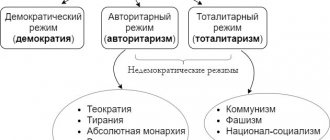- September 2, 2018
- Psychology of communication
- Nastasya Krakhina
Every person has had to fall under the influence of a manipulator at least once. When communicating with such people, a feeling of guilt arises, and you often have to do something that you really don’t want. Manipulators are usually very selfish. Therefore, they do not think about the feelings of others, wanting to subjugate their will.
This publication talks about how to identify the signs of manipulators in relationships and definitely determine what guides them when choosing this manner of behavior. Methods of psychological protection from such people will also be presented below.
Who are manipulators? Definition from a psychological point of view
Before moving on to the questions of who manipulators are, we should define the basic term. In psychology, the term “manipulation” refers to the technique of imposing a distorted idea of something. Based on this, a manipulator is a person who seeks to change the consciousness of others. The purpose of such behavior, as a rule, is to satisfy one's own desires or needs.
In fact, all people are manipulators to one degree or another. This fact is due to the fact that if you want to get a good position, force a child to clean his room, or persuade your loved one to buy something, you have to use some forbidden techniques. But people who consciously choose manipulation as a habitual way to achieve goals can be very dangerous.
In other words, we can say that they lead with an invisible hand and try to subordinate other, weaker individuals to their influence. As a rule, the consequences of communicating with such people are always negative.
Typology of manipulative character types by E. Shostrom
E. Shostrom, in his book “Anti-Carnegie or the Manipulator,” described what constitutes a type of social character called a “manipulator.”
He needs to control the situation at all costs: he is able to impose his will in everything, tries to manipulate any phrase, any situation.
A person is not born a Manipulator. He develops the ability to manipulate other people in order to avoid trouble and achieve what he wants, and he develops this ability unconsciously.
The modern Manipulator, Sjostrom believes, has developed from a market orientation, when a person is a thing that you need to know a lot about and which you need to be able to manage.
Hiding your true emotions is the lot of the Manipulator. The Manipulator sees his main task as making some “proper impression.”
Manipulation is not a necessary attitude towards life and does not bring any real benefit. Too often, the Manipulator uses psychological concepts as rationalizations for his dysfunctional behavior, justifying his current unhappiness by citing past experiences and past failures.
A manipulator is a person who has embarked on a path of self-destruction, who uses or controls himself and other people as “things.” The manipulator lives to some extent in every person. There are several main types of Manipulator.
1. Dictator.
Exaggerates his strength.
He dominates, orders, quotes authority and does everything to control his victims. Types of dictator: Abbess, Superior, Chief, Boss, junior Bosses.
2. Rag
(weakling) – usually a victim of a dictator, the polar opposite.
The Rag develops great skill in interacting with the dictator. He exaggerates his sensitivity, he forgets, he does not hear, he is passively silent. Varieties of Rags: Suspicious, Stupid, “Chameleon”, Conformist, Shy, Yielding.
3. Calculator
exaggerates his control.
He deceives, exaggerates, lies, tries to outwit and deceive other people. Variations of the Calculator: Businessman, Fraudster, Gambler, Advertising Creator, Blackmailer, Calculating everything in advance.
4. Stuck.
It is the polar opposite of the Calculator.
He exaggerates his addiction. This is a person who longs to be led, fooled, and cared for. He lets others do the work for him. Varieties: Parasite, Whiner, Eternal Child, Hypochondriac, Dependent, Helpless.
5. Bully
.
Exaggerates his aggressiveness, cruelty, and hostility. He: Abuser, Hater, Gangster, Menace.
Female variation -
Grumpy woman.
6. Nice guy.
He exaggerates his caring, love, kills with his kindness.
In some ways, confronting him is more harmful than confronting a Bully. The nice guy almost always wins. Varieties: Obsequious, Benevolent, Moralist, Organizational Man.
7. Judge.
Exaggerates his criticism.
He doesn’t trust anyone, is full of accusations, indignation, and has difficulty forgiving. Varieties: Omniscient, Accuser, Gatherer of Evidence, Bailiff, Shamener, Evaluator, Avenger, Forcer to Confess Guilt.
8. Defender.
The opposite of Judge.
He overemphasizes his support and tolerance for mistakes. He spoils others by sympathizing with them beyond all measure and not allowing his clients to get on their feet and grow on their own. Instead of minding his own business, he is ready to take care of the needs of others. Protector options: Mother Hen, Comforter, Patron, Disciple, Helper, Selfless.
In the Manipulator, one of these types or their combinations are hypertrophied. If a person is one of the types of Manipulator to the most pronounced degree, he projects its opposite onto the people around him and makes them his goals. For example, a Rag wife often chooses a Dictator husband and then controls him using all sorts of “subversive” methods.
Manipulation is a lifestyle, it is a life scenario that regulates the entire system of interaction with the world, aimed at controlling both oneself and others.
27)
The Heymans-Le Senne typology is the most practical and applied. Whatever field of activity we choose, we can find practical application in any of them. It works well in professional activities in the selection of employees and in consulting work, and also explains many issues and problems in family relationships and in family conflicts. This typology is indispensable in everyday life, especially since it is quite simple and understandable. But at the same time, this typology well explains the variety of types of human behavior. For those unfamiliar with psychology and non-professionals, it is convenient because it does not have a large theoretical basis, to understand which you need to read more than one volume of theoretical works. It is built on only three components, which are completely understandable to everyone, and 8 character types are well remembered.
Three components —
emotionality, activity and primacy-secondaryness are taken as the basis for the typology of characters. Based on these three components and their various combinations, Le Senna and Heymans received eight types of characters: 1) stormy, active; 2) passionate; 3) sanguine; 4) phlegmatic; 5) nervous; 6) sentimental; 7) amorphous-carefree ;8) apathetic. Before we begin to consider these eight character types, let us dwell on the meaning and description of the components themselves. Emotionality is how strongly a person reacts to external circumstances, that is, how easily he has an emotional reaction. For example, it is very easy to offend someone with one careless word, while for others even strong indignation does not cause an emotional reaction; some flare up like fire, others react to the same thing quite calmly. If a person has a strong emotionality, then we will designate this as E+, if a person has a weak emotional reaction, then E –. The second component is activity. Activity is an internal need for action or inaction (or for thinking about actions). Some people cannot spend a minute without action, they constantly need to do something, go somewhere, they must be constantly busy with something. Others, on the contrary, are constantly thinking about their actions. They think more than they do, they dream more than they act. If the former are depressed by the state of idleness, then for the latter it is a normal state from which they emerge without enthusiasm. If a person is active, then we will designate him as A+, and vice versa, inactive, as A –. The third component of this typology is the secondary and primacy of nature. Let us denote them with the first letters: B and P. These natures differ from each other in how long and strong the impressions, be they from the external or internal world, remain and continue to hold this personality captive. If a person has secondary traits, then, This means that this person works like a battery or accumulator, that is, he is more “charged” by impressions, they seem to accumulate inside. For example, he does not quickly forget grievances, is under the impression of an emotional experience for a long time, and does not immediately move away from arguments. His mood is even and calm. He rarely gets angry and is rarely seen in a depressed mood. But when he is “discharged,” his anger is powerful, like a “short circuit.” He is faithful to his habits and affections and rarely changes them. It is difficult to switch from one subject to another or from one task to another. If a person has traits of primacy, then this person, unlike what we considered above, does not remain impressed for long. They bounce off it as quickly as a ping-pong ball. If the actions of any factors are taken to be the blow of a tennis ball, then the blow, the response-reaction, seems to return immediately. Such a person easily adapts to reality, quickly changes his priorities, is easy-going, does not get lost in the face of surprises, and loves short activities. So, based on three components, Heymans and Le Senna identified eight characters. Human adaptability Adaptability is the level of actual adaptation of a person, the level of his social status and sense of self - satisfaction or dissatisfaction with himself and his life. A person can be harmonious and adapted or disharmonious and maladapted. Maladaptation is always psychosomatic (both soul and body) and occurs in three forms: neurotic (neuroses), aggressive-protest and capitulative-depressive (psychosomatic diseases and behavioral disorders). A person’s adaptability is ensured by evolutionarily selected ones that are appropriate for his nature. The first component of human nature that ensures adaptability is instincts. According to the concept of V.I. Garbuzov, seven instincts can be distinguished: self-preservation, procreation, altruistic, exploration, dominance, freedom and preservation of dignity.
28)
Adaptation is the level of actual adaptation of a person, the level of his social status and sense of self - satisfaction or dissatisfaction with himself and his life. A person can be harmonious and adapted or disharmonious and maladapted. Maladjustment is always psychosomatic (of both soul and body) and occurs in three forms: neurotic (neuroses), aggressive-protest and capitulative-depressive (psychosomatic diseases and behavioral disorders). Human adaptability is ensured by evolutionarily selected elements that are appropriate for his nature. The first component of human nature that ensures adaptability is instincts. According to the concept of V.I. Garbuzov, seven instincts can be distinguished: self-preservation, procreation, altruistic, exploration, dominance, freedom and preservation of dignity. Depending on the dominance of one or another instinct, the primary fundamental typology of individuality follows. And each person belongs to one of seven types: I – “egophilic”, II – “genophilic” (Latin genus – “genus”), III – “altruistic”, IV – “research”, V – “dominant”, VI – “libertophilic” (Latin libertas – “freedom”), VII – “dignitophilic” (Latin dignitas – “dignity”). Let us present brief personal characteristics within the framework of the above typology. I. egophilic type. From early childhood, a person of this type shows a tendency towards increased caution, the child does not let his mother leave his side even for a moment, is afraid of the dark, heights, water, etc., intolerant of pain; on the basis of this type, a personality is formed with pronounced egocentricity, anxious suspiciousness, and a tendency under unfavorable circumstances to obsessive fears, phobias or hysterical reactions. II. genophilic type. It is characterized by a peculiar kind of ego that is replaced by the concept of “We” (by “We” we mean family) up to the denial of “I”. Values, goals, life plans are subordinated to one thing - the interests of children, family. The evolutionary expediency of having this type lies in the fact that its carriers are the guardians of the family, the guardians of the gene pool of the clan, and the guardians of life. III. altruistic type. People of this type are characterized by kindness, empathy, care for loved ones, especially the elderly, and the ability to give the last to others, even what they need themselves. They are convinced that it cannot be good for everyone if it is bad for someone alone. IV. research type. From early childhood, people of this type are characterized by curiosity, a desire to get to the essence of everything, and a penchant for creativity. At first, these people are interested in everything, but then they become more and more captivated by one passion. Travelers, inventors, scientists are people of this type. V. dominant type. From early childhood, there is a desire for leadership, the ability to organize a game, set a goal, show the will to achieve it, a personality is formed who knows what she wants and how to achieve what she wants, is persistent in achieving the goal, ready to take calculated risks, able to understand people and stories them behind you. VI. libertrophilic type. Already in the cradle, a child of this type protests when he is swaddled. The tendency to protest against any restriction of his freedom grows with him. People of this type are characterized by a desire for independence, denial of authority (parents, teachers), tolerance to pain, a tendency to leave their father's home early, a predisposition to risk, stubbornness, negativism, intolerance to routine, and bureaucracy. VII. Dignitaphilic type. Already in early childhood, a person of this type is able to grasp irony, ridicule and is absolutely intolerant of any form of humiliation. Characterized by recklessness, readiness to sacrifice everything in defending one’s rights, and an unshakable position “Honor is above all.” The self-preservation instinct of such a person is in last place. In the name of honor and dignity, these people go to Calvary without hesitation.
29)
Compatibility of people and typology Several levels can be distinguished in the compatibility of people.1.
The highest and most complex is value-orientation unity: the compatibility of life values, aspirations, ideals, interests, beliefs of people (the closer they are, the easier it is to understand each other and the stronger the compatibility).2. Coherence of a person’s functional-role ideas in a friendly, family, or labor union. For example, if family members have different understandings of their roles and present expectations and corresponding demands that are rejected by others, there will not be the necessary compatibility in the family, but many conflicts will arise. Here, a role is understood as a relatively stable pattern of behavior developed in a given society to implement a certain social function, i.e. behavior that is expected from a person by other people when performing certain functions (in a specific place, in specific circumstances). Inconsistency of ideas about roles, rights, responsibilities, leisure, distribution of household labor, striking discrepancies in everyday habits, etc. can seriously disrupt relationships between people and lead to incompatibility.3. Compatibility of individual psychological characteristics:❖ psychophysical compatibility of temperaments;❖ compatibility of innate qualities of psychosociotypes;❖ compatibility of acquired character qualities; sexual compatibility (it plays an important role in family relationships). In general, the following are necessary: 1. The ability to be critical of oneself.2. Tolerance of others.3. Trust in others. If these qualities are absent, a person cannot get along with other people. To achieve compatibility in small groups when they find themselves in isolation for a long time (polar expedition, crew of a spaceship or submarine), additional factors are required:1 . The maximum possible workload of people with purposeful activities.2. Accuracy in determining the task at hand and the period of coexistence.3. The possibility of privacy for each of the participants. Psychological selection of people according to their level of compatibility is always desirable. Depending on the level of activity/passivity and focus on external circumstances/personal experiences, American psychologists R. Ackoff and F. Emery identify different personality types and predict the degree of psychological compatibility (Fig. 6.12). OA and LP are coordinates for pure types
(person or reacts quickly and actively to external circumstances, without thinking about himself - type OA; or, conversely, is always busy with himself and tries not to be active - LP). The space of OP and LA is for mixed types (a person simultaneously monitors both circumstances and processes in his inner world).
Rice. 6.12. Typology of R. Ackoff, F. Emery
The combination of types gives 10 combinations: OP-LA, LP-OA, OA-LA, OP-LP, OP-OA, LP-LA, LA-LA, OP-OP, LP-LP, OA-OA.
Let us consider the unique behavior of people who make up such couples (for example, married ones) in conflict situations. 1. OP-LA.
If a conflict arises, people of each of the two types believe that it occurred through the fault of the LA (such a person actively realizes only his desires, and is often selfish).
However, paradoxically, both are trying to change the behavior of only the OP, who is influenced without resistance, compliant, as a result of which the conflict is easily extinguished. When a couple has friction with others, it is the OP who perceives the situation more sharply, but due to his passivity, he himself does nothing, but only reports the situation to the LA, after which he actually influences the situation in favor of the couple. Consequently, they do not compete with each other, but cooperate both psychologically and behaviorally.2. LP-OA.
In case of conflict, both of these types believe that the LP is to blame.
But due to his nature, the LP is not too susceptible to the effects of OA for his behavior to change. It is adjusted only after the PL gives an internal assessment of the need for such changes. OA is satisfied with the development of the situation, and the conflict subsides. In the event of a conflict with others, the PL hides behind the OA, allowing him to independently resolve the problems that have arisen and agreeing with his decision. This pair of people is stable and has a clear leader - OA.3. OA-LA.
Both people are sure that the aircraft is to blame for the conflict.
However, everyone tries to change not themselves, but their partner. Only the OA is capable of responding to such efforts (it is sensitive to external influences), but since it has an active character, it does not want to be influenced and does not respond to the actions of the aircraft. As a result, the conflict flares up, with OA playing a more active role in it. In relationships with others, both strive to influence the outside world (neighbors, colleagues, relatives, children) and conflict with each other over the management of this influence. The couple finds it difficult to get along with the people around them and is quite conflictual in their internal relationships.4. OP-LP.
In the opinion of both, the LP is to blame for all the problems, although each seeks to change only himself.
The OP believes that he is constantly sacrificing himself for the sake of a peaceful relationship, but the LP does not see these sacrifices and does not show whether he appreciates the OP’s self-sacrifice. This does not contribute to the stability of the couple. This couple is most often unable to change the environment in order to reduce the severity of external and internal problems. She is perceived as a passive, inactive couple, dissatisfied with each other.5. OP-OA.
Everyone understands well that the conflict that arises between them affects the behavior of their partner.
However, OP is trying to change herself, and OA is only trying to change the other side. Because she is susceptible to outside influence, she responds to the OA's demands and peace is restored. At the same time, the establishment of harmonious relationships of such a couple with other people is hampered by the fact that the OP and OA see the problems that arise with others differently. In addition, they unwittingly transfer the conflict into the sphere of their interpersonal relationships. In order to maintain stability, they need (and they try to do this) to reveal to each other their views on the environment and their relationships as little as possible, because almost any statement leads to a quarrel. In the eyes of others, this is a couple in which one of its participants is under the “shoe.”6. LP-LA.
Each of them is very indifferent to the actions of their partner and responds poorly to them.
At the same time, the LA is trying to use the second side for its own purposes, but since it is very insensitive to such influence, these attempts fail. Over time, the LA's desire to influence the situation wanes, and the partners move away from each other. They are inactive in relationships with others, as they are busy with their own problems. From the outside they seem peaceful, although rather indifferent to their partner. Under unfavorable circumstances, this indifference can provide the couple with a certain stability.7. LA LA.
In case of conflict, everyone considers the problem from the point of view of how it can affect their personality, without taking into account the partner’s reaction, and seeks to influence the other in order to achieve their goals.
Both, however, do not succumb to such influence, do not react to it, and therefore conflict a lot without apparent success. Both are unaware of their impact on others, nor of how external circumstances affect the couple’s relationship. At the same time, both are trying to change other people, but they are making efforts separately, trying to turn things in their favor. From the outside they look like an aggressive, conflicting (quarrelsome) couple who do not understand what the world around them is like and what is happening in it.8. OP-OP.
According to each partner, the cause of the conflict lies in the actions of the other.
At the same time, both strive to avoid collisions, which stabilizes the couple as a whole. They see external circumstances in the same way, but everyone is either passive or trying to solve problems on their own. They do not try to change the environment through joint efforts. Outwardly, they are a peaceful, passive, partly friendly and compliant couple, although uncommunicative.9. LP-LP.
Each does not respond too much to the actions of the other, so they do not conflict, but they do not interact either.
Without pestering himself, he is glad that he is not offended either. The conflict that arises fades away very quickly, since no one is throwing wood on the fire. The couple does not communicate, and therefore does not conflict with other people. When external circumstances change, everyone tries to independently adapt to the changes. To those around them, this couple does not seem very interesting, although they are peaceful.10. OA-OA.
“The other is to blame for everything” - this is the point of view shared by this couple, therefore each partner considers it his duty to try to change the behavior of the other, but the other does not respond to his efforts. Everyone thinks that the other side does not understand him, and he tries to prove that he is right. The conflict over this does not go away for a long time. To achieve peace, both can try to change the environment, but even in this case they will compete with each other. Having started a conflict with people, they certainly argue with each other. Those around them perceive this couple as quarrelsome and hostile. Its stability is minimal. Numerous studies on the compatibility of people have made it possible to formulate its main law: the innate qualities of partners should be contrasting, while the acquired qualities should be similar. The union of spouses who are not too different in their origin, living conditions, and upbringing is more durable because in this case, the likelihood that attitudes, values, interests, ideals, habits (i.e., acquired qualities) will coincide is obviously higher.
30) Motivation
(from lat.
movere
) - incentive to action; a dynamic psychophysiological process that controls human behavior, determining its direction, organization, activity and stability; a person's ability to actively satisfy their needs.
Extrinsic motivation
(extreme) - motivation that is not related to the content of a certain activity, but is conditioned by circumstances external to the subject.
Internal motivation
(intrinsic) is motivation associated not with external circumstances, but with the very content of the activity.
Positive and negative motivation
.
Motivation based on positive incentives is called positive. Motivation based on negative incentives is called negative. Example: the construction “if I clean up the table, I will get candy” or “if I don’t play around, I will get candy” is a positive motivation. The construction “if I clean up the table, then I won’t be punished” or “if I don’t play around, then I won’t be punished” is a negative motivation. Sustainable and unstable motivation
. Motivation is considered sustainable if it is based on a person’s needs, since it does not require additional reinforcement. There are two main types of motivation: “from” and “to”, or the “carrot and stick method”. Also distinguished: individual motivations aimed at maintaining homeostasis, hunger, thirst, avoiding pain, striving for temperature optimum; group, caring for offspring, finding a place; in a group: hierarchy, maintaining the community structure inherent in a given type, cognitive: investigative behavior, play activity
What types of manipulators are there? Signs and psychology of behavior
How such a person will behave depends on what kind of nervous system he has. Overall, it can be weak or strong. A weak nervous system forces a person to withdraw into himself, seclude himself and constantly be in the world of his own illusions. A strong nervous system allows a person to quickly adapt to a changing environment. Based on this, manipulators can be either weak or strong individuals.
As a rule, the habit of striving to control the consciousness of other people can be traced back to childhood. For example, a child, during his whims, realized that at that moment his parents were ready to do anything to calm him down. Having matured, he adheres to the same manner of behavior: he manipulates others, presses for pity, positions himself as undervalued, which forces others to follow his lead. In this case, there are signs of a manipulator with a weak nervous system.
In the second case, an absolutely opposite behavior pattern is observed. Signs of manipulative people with a strong nervous system are ambition, shamelessness, and courage. With the help of such qualities, a person with the power of his spirit suppresses others and inspires them with what will help him achieve what he wants. A striking example of manipulators with a strong nervous system are many politicians, fashion trendsetters, journalists, as well as people heading public or religious organizations. With their authority, they force people to think as they please, usually for the purpose of their own moral, financial or other benefit.
However, there are some points that unite these two groups of manipulators. These include cynicism and excessive self-love.
The mechanism of manipulation development
Why does a manipulative person become the way he is? Some people are manipulators from birth; for them it is a natural psychological trait, and they are not even aware of their capabilities. However, most manipulative people become this way on purpose.
It is common for a manipulator to have a feeling of superiority over other people, but for some reason he is unable to realize this superiority; for example, he is too physically weak for this or does not have the appropriate social status. Having no open ways to get what he wants from other people, he uses deceit and cunning. Manipulators are driven by the highest degree of egoism, when in order to get what they want, they are ready to penetrate even the very depths of the interlocutor’s soul. They treat other people as inanimate objects that they have the right to move as they please.
Without showing respect for the people around them, manipulators, however, are in dire need of them. Without people, a manipulator cannot exist at all, since in itself he is nothing. There are concepts close to manipulation - parasitism, energy vampirism. A manipulator is a real vampire who uses the achievements of others as his own and asserts himself at their expense.
Types of manipulators
Many psychologists are inclined to the idea expressed in his works by the American psychotherapist Everett Leo Shostrom. He argued that manipulators are deceitful individuals who have lost the ability to feel the warmth of human feelings. In return, they get used to the falsehood that they themselves spread.
In general, the following types of manipulators are distinguished:
- superficial polymath;
- seducer;
- player;
- whiner;
- interested;
- shirt guy;
- aggressive;
- patron.
It is worth considering in detail the listed types of manipulators and the signs of their behavior. This point is extremely important in the study of such people. This information will help you recognize the signs of manipulators and build the correct model of communication with them.
Superficial polymath
Such people pretend to be an erudite person, but at the same time their knowledge is very superficial. They specially prepare, memorize information that they need only in order to impress others.
A superficial erudite tries to show off his “authoritative opinion” on any subject. In fact, such a person does not have a real interest in many things. He is guided by only one desire - to look decent in the eyes of others, in order to use them to satisfy certain needs.
Isolation, lack of care
Having lived with an emotional tyrant for 9 years, I have personally experienced all these passive-aggressive tricks. When, after the divorce, I read books on psychology and found an identical resemblance to the psychological portrait of my ex-husband, I was left wondering: how were all these characteristics copied so accurately from him?
But at that time I felt that I was placed in some kind of parallel reality. My will was broken, my self-esteem was destroyed. His favorite technique was the “cold war,” which could last up to two months. At the same time, my ex-husband pretended that I did not exist in the house. He didn’t talk to me, didn’t show concern, and waited for me to confess.
A gigantic “flying saucer” hovered over the square in Sofia
Rosstandart: “Every tenth gas station deceives.” How to protect yourself from underfilling
Electronic prescriptions in Russia will allow you to order prescription medications online
It would seem that his method did not work, because I did not succumb to these tricks and did not take responsibility for his next insult. However, living in a big house in isolation was causing me to slowly go crazy. I think that if I had not managed to break out of this vicious circle, in the end it would have broken my will.
Seducer
As a rule, men choose this behavior. Signs of this type of manipulator are manifested in the fact that a person uses sex as a tool to manipulate the consciousness of other people. He is ready to sleep with anyone to achieve his goal.
Most often, such people are business people. In general, they are not particularly interested in sex itself. What is more important to them is what they can get with it. It is important to note that women can also act as such a manipulator, but this is not observed so often, due to the fact that many girls are instilled with a sense of dignity from childhood.
Methods of managing people: according to Breaker and Simon
Psychologists Simon and Breaker identified a variety of methods for managing people.
Here are some of them actively used by puppeteers
:
- Lie;
- Deception through omission;
- Negation;
- Distraction (moving to another topic);
- Covert bullying;
- Shaming (the victim communicates self-doubt and fear through sarcasm).
Player
For such people, life is a game, and he is an actor. Often he gets carried away, and the rules of his game become more important to him than the result he strives for. In appearance, such a person is calm, since the entire scenario of his actions is already written in his head. He wants all people to unquestioningly play the roles that he has assigned to them. If anyone does not want to do this, he becomes furious.
Such manipulators are dangerous because they do not understand their functions in society, and therefore are very unreliable in work, love relationships and friendships.
Why do people become manipulators?
In psychology there is no consensus on this matter: researchers name different reasons, and they all have a place to be, because each individual case is unique.
Reason 1. Mistrust
This refers to distrust of yourself and everyone else. The manipulator is in constant conflict with himself, because he does not know what to expect from himself in the next minute. He transfers suspicions to others. As soon as a person important to him appears in his circle, his influence seems to tie him to himself, not giving him freedom. Full control provides him with at least some temporary peace of mind. This is Frederick Perls's point of view.
Reason 2. Power
The manipulator wants to gain unlimited power over others: it doesn’t matter whether it’s one person or a whole crowd. Through his actions, he forces them to do, feel and think only what HE wants and can control. This is Erich Fromm's point of view.
Reason 3. Powerlessness
A passive manipulator, admitting his own powerlessness, evokes pity for himself, and people, due to their gentle nature, fulfill his wishes. An active person, on the contrary, uses the helplessness of others in order to subjugate them to his will.
Reason 4. Approval of others
For this reason, a person with low self-esteem becomes a manipulator. His task is to gain the approval of everyone around him. Moreover, he often hates them, but he always smiles flatteringly, gives gifts, says compliments and by hook or by crook pretends to be the sweetest person. Ellis's point of view.
Reason 5. Fear of difficulties
There are people who are afraid to make responsible decisions and change their own lives. Their task is to avoid them, and this can be done through someone who is nearby and can provide them with the necessary comfort. Burn's point of view.
Among other reasons, psychologists identify:
- market relations, when a person must manipulate others in order to save his business and remain competitive;
- family relationships that the manipulator saw in childhood, for example, when the father forced the mother to fulfill his every whim;
- the desire to play with the feelings of others, to make sure of one’s own worth.
In fact, psychological manipulation is a complex mechanism that most often cannot be explained by a single cause. They all go in one ball, sometimes turning a person into a real monster.
An example from life. One of the schools was reputed to be the best in the city: competent teachers, excellent education, high percentage of admission to universities. Everything was fine until the head teacher ended up in a psychiatric clinic. The conduct of her case revealed the reason for the school’s success: its director manipulated his deputy for 5 years. She was initially passive, driven and controlled (+ single mother), which he took advantage of: he put pressure on her through blackmail (I would fire her, deprive her of her salary and bonus, ruin her work record, expel her son). As it turned out, she did all the work at school both for him and for herself, and was convinced that everything she had achieved over the years was his merit.
The woman had to undergo a long rehabilitation course. Both psychologically, in order to get rid of the influence, and physically, since all these 5 years she worked without vacation and practically without days off, bringing herself to exhaustion and exhaustion.
The director also failed to avoid forced observation by psychologists. It was found that he did this for several reasons: comfort at the expense of another, submission of the powerless, a great desire to gain the approval of others. And most importantly, a serious personality disorder (hysterical along with passive-aggressive).
Whiner
The main signs of a manipulator belonging to this type are an endless search for sympathy from others. He always feels bad, and he strives to share this with other people.
Often many people show pity for him and try to console and help. When communicating frequently with such a person, a feeling of moral duty to him arises.
Stuck
0
It is the polar opposite of a calculator. He exaggerates his dependence and helplessness. This person longs to be led, fooled, and the object of concern for others. She lets others do her work for her. Varieties: parasite, whiner, eternal child, hypochondriac, dependent, helpless.
Interested
During a conversation, such a person shows an excessive amount of emotion and pretends that he is incredibly interested in the topic of conversation. He often inserts phrases such as “come on”, “really?”, “wow”, “how interesting”. But in fact, he is absolutely not interested in what they tell him.
The goal of such a manipulator is the desire to win over other people. He plays the role of an attentive, sensitive and responsive person. In return for his good nature and attention, other people often repay him with material benefits.
Obstacle to achieving goals
The manipulator constantly comes up with ways to slow down the personal and professional development of the victim. For example, he will blame his wife, who is on maternity leave, for reducing the quality of life of the family, but at the same time he will not want to let her go to work (he will prevent her from moving to a higher-paying position).
This, at first glance, paradoxical picture allows you to keep your other half financially dependent. At the same time, the emotional aggressor will be extremely reluctant to part with his money, and in the end he will completely “cut off the oxygen.”
Aggressive
Such people are often hostile towards everything. They can be compared to dictators. They are unfriendly, and their behavior is almost always aggressive. These people allow themselves to criticize everyone and everything.
This behavior instills fear in weaker and fearful people who have to communicate with this person. By instilling fear, aggressive manipulative people get what they need from others.
Negative review
Another favorite technique of my ex-husband is public negative criticism of me. At the very beginning of the relationship, I missed this alarm bell. He allowed himself to throw mud at his own brother, made fun of his “stupid” actions and denigrated my relatives at every opportunity.
It seemed to me then that a childish jealousy of his younger “more beloved” brother still lives in an adult man. Only a few years later I realized that I myself had become a reason for ridicule. As soon as a large company gathered in our house, arrows with negative criticism immediately flew at me.
The neighbors who met me on the street told me how badly my husband spoke about me. I dare to assume that these people were on my side and tried to open my eyes to the true state of affairs.
All these negative comments are aimed at unsettling the victim. In addition, by belittling a partner or relative in front of third parties, the manipulator inflates his sense of self-importance.
Doctor Myasnikov named measures to prevent Epstein-Barr virus (95% of people have it)
Like a rug: Jane decorated an old concrete porch with a stencil and paint
Video of a disappearing lake in Oregon captivates from the first minutes of viewing
Manipulators within the family
It’s one thing when you have to deal with manipulators at work or in society, and another thing when such individuals are family members. In this case it is much more difficult. Situations where a family member may act as a manipulator should be considered. The signs in the advice of psychologists are quite clearly defined.
A manipulative husband may use the following behavior patterns:
- "Do it if you love me." Most often, this behavior is observed in young people who believe that if they are loved, then they can receive absolutely everything.
- Avoidance of responsibility. This can manifest itself in phrases addressed to your wife such as “You’re so smart”, “You do it better than me”, etc. All this indicates signs of a manipulative man in a relationship and his reluctance to fulfill any work. Sometimes it is easier for a man to admit his inadequacy than to force himself to do something for the sake of his family.
- Resentment. This manner of manipulation is the most common. When a person feels guilty for something in front of his loved one, he is ready to go to great lengths to correct this situation. Often the spouse may not even think that such behavior of her loved one is a sign of a manipulator. The husband, in turn, influences his wife’s behavior and gets everything he needs.
A manipulative wife, as a rule, uses the following techniques:
- “I’m weak.” Our society is structured in such a way that men are taught from childhood that girls are weaker. In general, this is acceptable, but the norm in family relationships is an equal division of responsibilities. A woman may use this method of manipulation to avoid responsibility for some household responsibilities. However, one should not confuse manipulation with an objective request for help in difficult matters.
- Resentment. As in the case of a man and his signs of a manipulator in a relationship with the help of insults, women use this technique in order to get what they want.
In a family, both representatives of the older generation - parents and children - can act as manipulators. Parents can push for pity or show their superiority in life experience. Children, in turn, use whims, knowing that their parents will follow their lead.
Common methods of manipulation
The manipulations are extremely varied. Conventionally, they can be divided into “bitter” and “sweet”.
The first are based on fear and pity. When a boss yells at his subordinates for no particular reason, he is using aggression and the fear it causes to force others to comply with his terms. When a person demands help over and over again, but nothing changes for the better, no matter how hard he tries, he uses helplessness and compassion to get other people’s time or material resources.
Common "sweet" manipulations are more difficult to recognize because they are often camouflaged with praise and promises. For example, a man can promise marriage to his mistress, who has already given birth to a child from him, and everything would be fine, but... he has been repeating this for five years. The child has long stood on his feet, and his dad still only goes to visit his mother, informing his legal wife in advance that he will be late for meetings.
How to recognize manipulation? After all, anger, complaints, promises and praise seem so sincere. Obviously, the disproportion of what is happening should be alarming: the boss screams every day; the poor friend needs help in everything, although there are some things he could handle on his own; The lover has been dragging his feet on the divorce for years. In fact, we usually know that something is wrong, but we often cannot say “no.”
Paradoxically, in order to learn how to do this, you yourself need to stop manipulating others.
How to protect yourself from the actions of manipulators?
Knowing the signs of manipulators, you can understand how to protect yourself from their pressure. To do this, it is recommended to adhere to the following rules:
- Define behavior. First of all, you need to understand what type of manipulators you have encountered and what techniques are characteristic of them. This will make it possible to find out the motives for his behavior.
- Turn off emotions and turn on cold calculations. Do not immediately counterbalance and prove to the person that his plan has been revealed. You just need to hide your emotions and try to avoid communication.
- If necessary, cool down the manipulator. If the situation allows, you can express your objections to his opinion. However, this should be done in a very sensitive manner, without entering into open confrontation.
- Stay yourself. In order not to follow the manipulator's lead, you need to remember your opinion. It’s better to interrupt the conversation and give yourself time to understand “do this person’s words really correspond to my life principles.”
The most important thing to remember is that you should not be the instigator of the conflict, even if you managed to expose the manipulator. As a rule, such people are extremely difficult to correct, and unnecessary quarrels will not do any good. It is better to simply avoid communicating with people who seek to manipulate consciousness.
Sarcasm and teasing
Passive-aggressive manipulation is based on sarcastic grins, teasing and caustic remarks towards the partner. This is difficult to discern right away for the simple reason that close people will allow each other to make fun of themselves. But one day, friendly banter can take things to the next level.
Sarcasm is used by the manipulator as a weapon that slowly kills the victim. With each new time, the injections will be more caustic and deeper. A gradual increase in the amount of sprayed poison ensures addiction. And if you get angry at one of the comments, the aggressor can always write it off as a joke. At the end of the conversation, he will add the catchphrase: “You have become too sensitive.”
Do you need to replace the tulle on your windows? Calculate its size
Horses, ducks and even dragons: what figures were carved on the roof of a Russian hut
What to do to prevent lipstick from imprinting on the mask: draw an outline with a pencil











